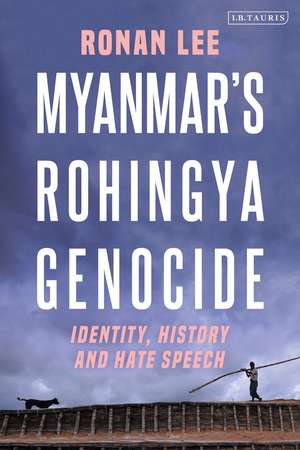Myanmar’s Rohingya Genocide: Identity, History and Hate Speech
Autor Ronan Leeen Limba Engleză Paperback – 24 feb 2021
| Toate formatele și edițiile | Preț | Express |
|---|---|---|
| Paperback (1) | 156.28 lei 6-8 săpt. | |
| Bloomsbury Publishing – 24 feb 2021 | 156.28 lei 6-8 săpt. | |
| Hardback (1) | 470.01 lei 6-8 săpt. | |
| Bloomsbury Publishing – 24 feb 2021 | 470.01 lei 6-8 săpt. |
Preț: 156.28 lei
Preț vechi: 168.08 lei
-7% Nou
Puncte Express: 234
Preț estimativ în valută:
29.91€ • 31.98$ • 24.93£
29.91€ • 31.98$ • 24.93£
Carte tipărită la comandă
Livrare economică 17 aprilie-01 mai
Preluare comenzi: 021 569.72.76
Specificații
ISBN-13: 9780755602476
ISBN-10: 0755602471
Pagini: 320
Ilustrații: 10 bw illus
Dimensiuni: 156 x 234 x 19 mm
Greutate: 0.5 kg
Editura: Bloomsbury Publishing
Colecția I.B.Tauris
Locul publicării:London, United Kingdom
ISBN-10: 0755602471
Pagini: 320
Ilustrații: 10 bw illus
Dimensiuni: 156 x 234 x 19 mm
Greutate: 0.5 kg
Editura: Bloomsbury Publishing
Colecția I.B.Tauris
Locul publicării:London, United Kingdom
Caracteristici
A current event which will engender a large body of research, this will be a key text shaping the arguments around the Myanmar genocide.
Notă biografică
Ronan Lee is a Doctoral Prize Fellow at Loughborough University London's Institute for Media and Creative Industries. His research focusses on the Rohingya, genocide, hate speech, migration, and Asian politics. Ronan has been a Visiting Scholar at the International State Crime Initiative, School of Law, Queen Mary University of London, and was a Queensland State Member of Parliament (2001-2009), serving on the frontbench as a Parliamentary Secretary (2006-2008) in portfolios including Justice, Main Roads and Local Government, and Aboriginal and Torres Strait Islander Partnerships. He has also worked as a senior government advisor, and as an election strategist and campaign manager. Ronan was awarded the Early Career Emerging Scholar Prize 2021 by the International Association of Genocide Scholars.
Cuprins
List of Illustrations Acronyms Introduction: Bamboo, Tarpaulin and Mud Chapter 1. Rohingya Roots in Ancient Arakan Chapter 2. British Colonial Rule and Rohingya Identity Chapter 3. Citizenship Laws: Making Rohingya Stateless Chapter 4. Myanmar's Failed Political Transition Chapter 5. Conflicting Historical Narratives Chapter 6. People Would Like to Demolish Our History Chapter 7. We are Rohingya Chapter 8. Seeking Common Ground Acknowledgements Bibliographical Survey Notes Index
Recenzii
25 years after the genocide against the Tutsi in Rwanda, will the international community really allow this to happen again? With Ronan Lee's profound new offering, we can no longer claim ignorance about the horrific plight of the Rohingya people.
Ronan Lee's book is one of the most important studies of the ongoing genocide against the Rohingya in Myanmar to date. It seeks to understand the Rohingya situation in its proper historical context and contemporary political situation, offering a fair, reliable, insightful analysis that identifies the many factors that will keep contributing to this crisis. The biggest contribution, however, is the examination of the genocide from the perspectives of different individuals involved in the crisis, which reveals just how complicated and difficult a resolution will be. This book is highly recommended to anyone seeking to understand the crisis, and importantly, those in governments and NGOs who can adapt practice on the basis of insights a careful reading of this volume offers.
In his new book, Myanmar's Rohingya Genocide, Lee in effect predicted the current seizure of power by the military ... Lee conducted fieldwork in Myanmar and its neighbouring countries, and his book is determined to tell the stories of the Rohingya themselves.
Ronan Lee's book is one of the most important studies of the ongoing genocide against the Rohingya in Myanmar to date. It seeks to understand the Rohingya situation in its proper historical context and contemporary political situation, offering a fair, reliable, insightful analysis that identifies the many factors that will keep contributing to this crisis. The biggest contribution, however, is the examination of the genocide from the perspectives of different individuals involved in the crisis, which reveals just how complicated and difficult a resolution will be. This book is highly recommended to anyone seeking to understand the crisis, and importantly, those in governments and NGOs who can adapt practice on the basis of insights a careful reading of this volume offers.
In his new book, Myanmar's Rohingya Genocide, Lee in effect predicted the current seizure of power by the military ... Lee conducted fieldwork in Myanmar and its neighbouring countries, and his book is determined to tell the stories of the Rohingya themselves.
